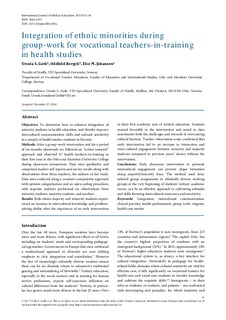| dc.contributor.author | Goth, Ursula-Georgine Småland | |
| dc.contributor.author | Bergsli, Oddhild | |
| dc.contributor.author | Johansen, Else Marie | |
| dc.date.accessioned | 2017-07-06T07:53:55Z | |
| dc.date.available | 2017-07-06T07:53:55Z | |
| dc.date.created | 2015-10-24T20:15:46Z | |
| dc.date.issued | 2017 | |
| dc.identifier.citation | International Journal of Medical Education. 2017, 8, 31-36 | nb_NO |
| dc.identifier.issn | 2042-6372 | |
| dc.identifier.uri | http://hdl.handle.net/11250/2448017 | |
| dc.description.abstract | Objectives: To determine how to enhance integration of minority students in health education, and thereby improve intercultural communication skills and cultural sensitivity in a sample of health teacher students in Norway. Methods: After a group-work intervention and for a period of six months afterwards we followed an “action research” approach and observed 47 health teachers-in-training in their first year at the Oslo and Akershus University College during classroom interactions. Data were qualitative and comprised student self-reports and survey results along with observations from three teachers, the authors of the study. Data were analyzed using a constant comparative approach with opinion categorization and an open coding procedure, with separate analyses performed on observations from minority students, majority students, and teachers. Results: Both ethnic majority and minority students experi-enced an increase in intercultural knowledge and problem-solving ability after the experience of an early intervention in their first academic year of tertiary education. Students reacted favorably to the intervention and noted in class assessments both the challenges and rewards of overcoming cultural barriers. Teacher observation notes confirmed that early intervention led to an increase in interaction and cross-cultural engagement between minority and majority students compared to previous years’ classes without the intervention. Conclusions: Early classroom intervention to promote intercultural engagement can prevent clique formation along majority/minority lines. The method used here, tailored group assignments in ethnically diverse working groups at the very beginning of students’ tertiary academic career, can be an effective approach to cultivating attitudes and skills fostering intercultural awareness and sensitivity. | nb_NO |
| dc.language.iso | eng | nb_NO |
| dc.publisher | IJME | nb_NO |
| dc.relation.uri | https://www.ijme.net | |
| dc.subject | helsefagarbeidere | nb_NO |
| dc.subject | migrant education | nb_NO |
| dc.subject | migrasjonspedagogikk | nb_NO |
| dc.subject | vocational education | nb_NO |
| dc.subject | yrkesfaglærerutdanning | nb_NO |
| dc.subject | licensed practical nurse | nb_NO |
| dc.title | Integration of ethnic minorities during group-work - vocational teachers training in health studies | nb_NO |
| dc.type | Journal article | nb_NO |
| dc.type | Peer reviewed | nb_NO |
| dc.subject.nsi | VDP::Pedagogiske fag: 280 | nb_NO |
| dc.subject.nsi | VDP::Education: 280 | nb_NO |
| dc.source.pagenumber | 31-36 | nb_NO |
| dc.source.volume | 8 | nb_NO |
| dc.source.journal | International Journal of Medical Education | nb_NO |
| dc.identifier.doi | 10.5116/ijme.5862.505a | |
| dc.identifier.cristin | 1283298 | |
| cristin.unitcode | 251,3,0,0 | |
| cristin.unitname | Fakultet for helsefag | |
| cristin.ispublished | false | |
| cristin.fulltext | original | |
| cristin.qualitycode | 1 | |
